
The big question: which English Language test do I need to get into University?
English-language universities want to be sure you can understand the material presented to you in class and in texts, and can complete your assignments satisfactorily. In most cases, this means you will need to provide an acceptable certificate showing a minimum English level.
What is an acceptable certificate?
There are several internationally recognised test certificates that can fairly reflect your language level, and most universities indicate the minimum they require in terms of these standards. Let’s look at how to navigate through the English language testing maze.
How is my English is classified?
You will probably be aware of the broadest classification of English levels elementary, intermediate, and advanced. You probably also know that to go to university, you’ll need to be at intermediate level or better on this scale. However, the basic scale is too “coarse” – it does not distinguish less fluent intermediate speakers from more fluent intermediate speakers, and it does not identify your competence in the individual skills (reading, writing, listening, speaking). For that, we need a finer scale.
The Common European Framework of Languages
The Council of Europe approached the problem by designing a Common European Framework of Languages (CEFR), with the happy purpose of “facilitating transparency in testing and the comparability of certifications”. You may already be familiar with the scale, and it is recognised across Europe (and often globally). You can see it below, with our (paraphrased) comments, and it indicates that for undergraduate studies, you will need to be at B2 level.

This is an improvement over the original scale. However, although you should definitely understand the CEFR scale, and use it as a basic guide, the problem is that it is still not detailed enough for the universities. Many universities demand ‘B2-level English’, but they go on to be much more specific, because they need to know more precisely how good you are, and they require more detailed scores across the four skills areas.
This is where all the commercial testing systems come in, providing detailed levelling systems and selling very expensive courses, books and materials, and exams. Test-making and test-selling is BIG business, and all the testers would like to convince you that their own version of the scale is best. This makes things complicated – both for universities, and for you.
So, how do I choose?
Without going into the details of all the tests, below is a table of how the main testing systems appear to relate to CEFR levels.

We are mostly interested in the B2 row. However, we still need to be very careful, because none of the testers provides a reliable guide to help you understand exactly what you need on their scale, and you will often see disclaimers on their sites, or ‘bands’ made so wide as to be all but useless to universities. For example, to achieve CEFR B2 level in IELTS, you will see that any score from 5.5 to 6.5 will do, and TOEFL will tell you that you need a score of anywhere between 72 and 94 on their testing system.
What does my Uni say?
If it is so difficult to be sure of the requirements we are being “sold” by the testing systems, how do we know what score to aim for? Well, probably the best thing to do is ignore the testing sites at this point, and check out what your chosen university says it requires. Not sure which university you want to go to? Well, to help you, we decided to sample 20 UK universities to see what specific requirements they list (March 2022). The results can be seen in the table below.

You can see that requirements are clearly not measured on the CEFR scale, but on some of the finer scales (those of the commercial testing systems). You can see that of these, IELTS and TOEFL remain dominant, with Pearson (PTE) and the Cambridge qualifications next. Trinity comes a close runner-up, and the relatively new Duolingo is still little-used at this time. Taking the two main testers, you can also see that you should be aiming for an IELTS score of 6.5 (although a 6.0 could do it if you’re lucky) and a minimum TOEFL score of 89.
Summary
The murky world of English Language testing can be difficult to understand, and you should not waste too much of your time trying to figure it out. The best advice is to go straight to the website of your chosen university. Take a look at the tests it accepts, and the minimum test score required for your subject (it does vary!). If the requirement is only stated very broadly as “B2”, or if you are not sure which university you will go to, use our table to choose a test and a minimum score to aim for.
We hope this has helped you understand the options open to you and the overall score you need in the two most common tests. In the next article in the series, we’ll take a look at the detail of the tests, breaking it down across the four skills – reading, writing, listening and speaking.



